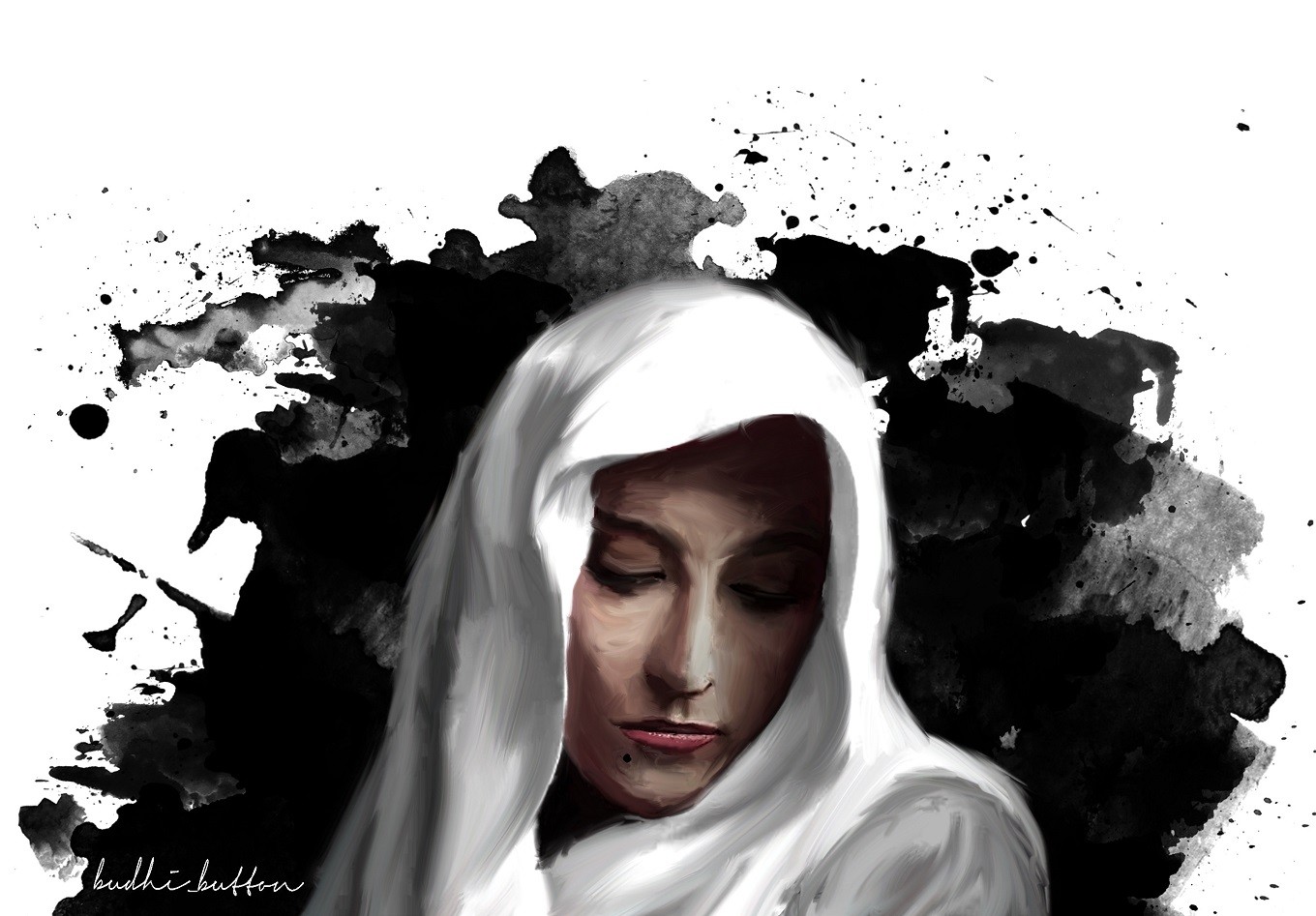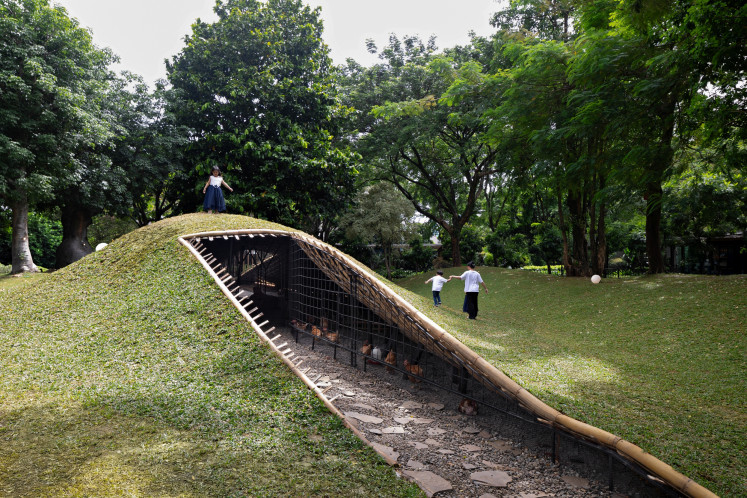Popular Reads
Top Results
Can't find what you're looking for?
View all search resultsPopular Reads
Top Results
Can't find what you're looking for?
View all search resultsSHORT STORY: The white veil
The events that preceded his current state flashed before him. The ambush. The gun shots. The mosque’s terrace. The rumbling of trucks. The obscure night. And Meutia.
Change text size
Gift Premium Articles
to Anyone
I
brahim woke up at 9 a.m. The old man had been lying across the floor, surrounded by people groaning and wailing in pain. The room was practically bursting with earpiercing cries.
He lay motionless, staring at the dusty bluish sky up above. There were lumps of cloud crowding the stretch of blue sky. The air was hot and dry. Amidst all the cacophony around him, Ibrahim looked like someone who was lost in a day dream. He couldn’t seem to get out of his head.
His eyelids quivered a little and the sun was shining bright on him. The light brought him back into reality and the world was full of tears coming from fellow refugees around him. The events that preceded his current state flashed before him. The ambush. The gun shots. The mosque’s terrace. The rumbling of trucks. The obscure night. And Meutia.
Meutia! Ibrahim jolted up and wobbled along searching for a face among the throng of refugees. It took him hours to get through the crowd, yelling his daughter’s name, his only treasure in the world. “Meutia, Meutia…” No answer. She was nowhere to be found. Ibrahim felt his heart sinking and realized everyone around him was probably feeling the same way after losing their children, wives, husbands, mothers…
At last, Ibrahim gave up. He sat down on the floor and dragged himself away from the crowd. Weary and worn out. He tried to see things clearer. How did he end up being separated from Meutia and her mother? Horrifying images of what had occurred only hours before — of his wife dying with her stomach cut open, soaking in her own blood — flashed through his mind.
Meutia’s mother has died. There was no doubt about it. It’s like a blade of split bamboo had pierced right through his heart. His soul cried out, but he no longer had tears to spend. Then he remembered his wife’s last words: “Just leave me... save our daughter.”
They both ran as fast as possible. Ibrahim and Meutia. They took nothing but the clothes on their backs, trapped among hundreds of other people trying to escape the horror. As they were running, Meutia’s white headscarf fell to the moist ground and Ibrahim stopped to pick it up. Gun shots and screams were not far behind them. “Father, just leave it,” said Meutia in a panic.
The chaotic noise echoed in Ibrahim’s ear as if it had come from beneath the ground he was walking on. Slowly, the noise dissipated, alienating him.
He felt a lump in his trousers’ pocket. He took it out. A white veil stained with blood. His heart was beating fast. He recognized the veil. Where is she? His eyes searched through the crowd once more.
For some reason, what happened next didn’t seem all that clear to him. Did Meutia make it to the grand mosque where some of the refugees had taken shelter? Or did she jump into the truck with the other refugees?
These questions lingered in his mind. But he didn’t have the answers. His throat burned, as if tears were about to burst out of him — but there were no tears left. He could only pray and hope that Allah the Almighty and Most Merciful would bless his daughter with salvation and allow them both to be reunited again.
His restless eyes were lost in thought. He could still hear the folk song Meutia used to sing when she was younger. Each time she returned home from learning how to read the Quran in a small mosque, she and her friends would spend time playing in the front yard, laughing and singing happy songs about bungong jeumpa or magnolia champaca flowers under the moonlight:
Bungong jeumpa, bungong jeumpa megah di Aceh Bungong telebeh, telebeh indah that rupa… Puteh kuneng, meujampu mirah Bungong jeumpa, indah lagoina…
A couple of days later, Ibrahim finally saw an opportunity. Seven young men with guns slung around their shoulders came into the shelter on a truck. They told him they’d evacuated girls and children to a safe place.
Ibrahim told them Meutia’s features. “She is slender and very beautiful. No, she’s not like me, she looks more like her mother. She’s seventeen. Big round beautiful eyes, black hair and there is a sweet little mole below her lips. Please find her. I hope Allah will bring you all the goodness for doing it.”
One of them replied, “If your daughter is still alive, we will find her.”
They went back to Lhokseumawe, taking many girls and children to the refugee camp. But they never found Meutia. The day after, they saw a girl on the street. She looked terrified and tried to escape. The truck stopped and young men jumped off to run after that girl. They stopped her. The girl was in shock and her face was pale. No doubt about it. This was Meutia, indeed: Ibrahim’s daughter.
The fully armed young men treated her well. They gave her food and water then took her on the truck. One of them lent his jacket so she could cover her body to keep her from the cold. The girl looked ill at ease without a veil covering her head. The wind blew at her hair. Nervously, she covered her thinly veiled breasts with both hands.
** * Days passed and Ibrahim still longed for his beloved daughter. He kept on waiting. No news, not even a single sign. Every day he searched through the refugee camps, hoping to find Meutia. In the evenings, he would get down on his knees and pray, begging God to deliver his daughter back to him. He prayed those men had found Meutia. Their words still echoed in his ears, “If your daughter is still alive, we will find her.”
One day, he came across these men in another camp. They were about to jump onto their truck and leave.
“Young man,” he shouted to one of them, “Did you find Meutia — my daughter?”
“We will find her soon,” one of them replied to him.
The old man recited another string of prayer for them silently. It gave him peace to do so, and it comforted his growing agony even for a little while.
One evening, there was a sudden stir in the camp. Ibrahim saw four men carrying the body of a young girl.
She was found unconscious on the street somewhere out of town. They took her to an emergency hospital nearby.
Ibrahim followed them. He stood dazed for a moment outside that emergency hospital before deciding to enter. In one of the rooms, he saw an open mattress. A body lay on it, motionless.
A light was turned on. There was a stiff face with a mole beneath her lips. Her eyes were closed. “Meutia!” Ibrahim cried out. A doctor came and stared at him. “I am her father,” Ibrahim explained, stuttering.
The male doctor observed the motionless body without saying anything. He touched her wrist to check for a pulse. The girl opened her eyes, trying to move her body.
Her slender hands touched the lower end of her clothes. Very slowly she untied the knot on her waist.
With an excruciating gentleness, she drew the cloth that had covered her feet to expose them. Then, without a word, she opened her legs. Her eyes stared vacantly.
“She’s still alive! My daughter is still alive!” Ibrahim screamed joyfully.
The doctor was turned aghast. Cold sweat ran down his neck. In Ibrahim’s hand was the white veil he had been holding onto for so long.
***
Anton Kurnia is an Indonesian short story writer, essayist, editor and the chief editor of Penerbit Baca.











